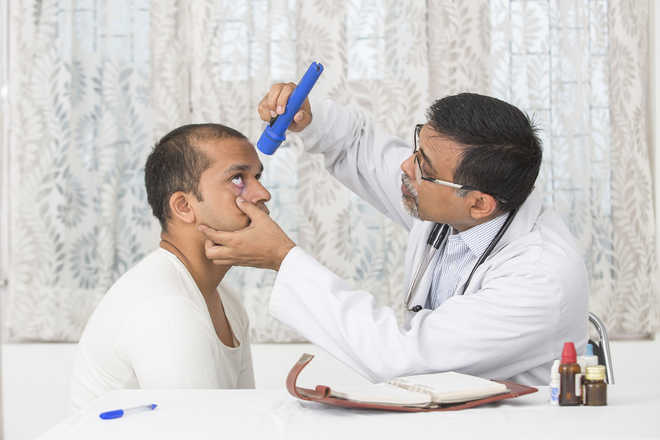
See reason: Early stage of diabetic retinopathy has no visual symptoms, hence all people with diabetes must go for an annual comprehensive dilated eye examination
Dr Rajeev Jain
Diabetes as a lifestyle disorder has assumed epidemic proportions. India, with more than 60 million and growing number of diabetics, has the dubious distinction of being the diabetic capital of the world. Diabetes can not only damage heart and liver but many other vital organs, including eyes.
It can cause an eye problem known as diabetic retinopathy that is irreversible and cause vision loss. According to a study, in approximately 70 per cent of adults above 40 years of age, blindness is due to diabetic retinopathy. Pregnant woman with diabetes also constitute a high percentage of diabetic retinopathy patients.
Diabetic retinopathy causes progressive damage to the retina, the light sensitive lining at the back of eye.
Diabetes, which interferes with the body’s ability to use and store glucose, can damage many vital body organs, including the eyes. Over time, diabetes damages the blood vessels in the retina. Diabetic retinopathy occurs when these tiny blood vessels leak blood and other fluids. This causes the retinal tissue to swell, resulting in cloudy or blurred vision. The condition usually affects both eyes. The longer a person has diabetes, the more likely he/she will develop diabetic retinopathy. If left untreated, it can cause blindness.
Diabetic retinopathy is more common in Type-II diabetes as compared to Type I cases. In some rare cases, the symptoms of diabetic retinopathy are seen in the initial stages but generally only basic symptoms are visible such as dark spots floating in the vision, blurred and fluctuating vision, vision loss, difficulty with colour perception; and dark or empty areas in vision.
Often, the early stage of diabetic retinopathy has no visual symptoms. That is why it is recommended that everyone with diabetes have a comprehensive dilated eye examination once a year by a retina specialist. Early detection and treatment can limit the potential for significant vision loss from diabetic retinopathy.
Treatment depends on the type and severity of the problem. It mainly focuses on slowing or stopping progression of the disease. Depending on the severity, the eye specialist can recommend various treatments. These may include:
Laser treatment: It is used to treat the growth of new blood vessels at the back of the eye (retina) and to stop the leakage of blood and fluid in the eye. It involves using a laser into the eyes; anaesthetic eye drops are used to numb the eyes and to widen the pupils. It generally takes around 20-40 minutes. There are some side-effects such as blurred vision and increased sensitivity to light.
Eye injections: In some cases, the specialist may inject medicine into eyes to decrease inflammation or prevent new blood vessels from forming at the back of the eyes. This will lead to improvement in the vision. The injections are generally given once in a month and once the vision starts to stabilise, frequency decreases and eventually stop. The few associated risks include eye irritation or discomfort, bleeding inside the eye, itchy eyes, floaters or a feeling of having something in the eye.
People with advanced cases might need a surgical procedure (vitrectomy) to remove and replace the gel-like fluid in the back of the eye, called the vitreous. Surgery may also be needed to repair an associated retinal detachment.
It is vital not to delay standard treatments in order to try unproven therapies. Early treatment is the best way to prevent vision loss.
— The writer is an ophthalmologist and director, Save Sight Centre, New Delhi
For a better sight
You can prevent or slow the development of diabetic retinopathy by:
- Taking your prescribed medications.
- Sticking to a diet suitable and recommended for diabetics.
- Exercising regularly.
- Controlling high blood pressure.
- Avoiding alcohol and smoking.



























